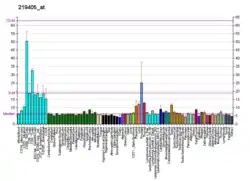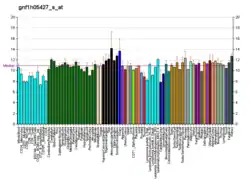TRIM68
Tripartite motif-containing protein 68 is a protein that in humans is encoded by the TRIM68 gene.[5][6]
| TRIM68 | |||||||||||||||||||||||||||||||||||||||||||||||||||
|---|---|---|---|---|---|---|---|---|---|---|---|---|---|---|---|---|---|---|---|---|---|---|---|---|---|---|---|---|---|---|---|---|---|---|---|---|---|---|---|---|---|---|---|---|---|---|---|---|---|---|---|
| Identifiers | |||||||||||||||||||||||||||||||||||||||||||||||||||
| Aliases | TRIM68, GC109, RNF137, SS-56, SS56, tripartite motif containing 68 | ||||||||||||||||||||||||||||||||||||||||||||||||||
| External IDs | OMIM: 613184 MGI: 2142077 HomoloGene: 9991 GeneCards: TRIM68 | ||||||||||||||||||||||||||||||||||||||||||||||||||
| |||||||||||||||||||||||||||||||||||||||||||||||||||
| |||||||||||||||||||||||||||||||||||||||||||||||||||
| |||||||||||||||||||||||||||||||||||||||||||||||||||
| |||||||||||||||||||||||||||||||||||||||||||||||||||
| |||||||||||||||||||||||||||||||||||||||||||||||||||
| Wikidata | |||||||||||||||||||||||||||||||||||||||||||||||||||
| |||||||||||||||||||||||||||||||||||||||||||||||||||
The protein encoded by this gene contains a RING finger domain, a motif present in a variety of functionally distinct proteins and known to be involved in protein-protein and protein-DNA interactions. This gene is expressed in many cancer cell lines. Its expression in normal tissues, however, was found to be restricted to prostate. This gene was also found to be differentially expressed in androgen-dependent versus androgen-independent prostate cancer cells.[6]
Interactions
TRIM68 has been shown to interact with Androgen receptor.[7]
References
- GRCh38: Ensembl release 89: ENSG00000167333 - Ensembl, May 2017
- GRCm38: Ensembl release 89: ENSMUSG00000073968 - Ensembl, May 2017
- "Human PubMed Reference:". National Center for Biotechnology Information, U.S. National Library of Medicine.
- "Mouse PubMed Reference:". National Center for Biotechnology Information, U.S. National Library of Medicine.
- Chang GT, Steenbeek M, Schippers E, Blok LJ, van Weerden WM, van Alewijk DC, et al. (November 2001). "A novel gene on human chromosome 2p24 is differentially expressed between androgen-dependent and androgen-independent prostate cancer cells". European Journal of Cancer. 37 (16): 2129–34. doi:10.1016/S0959-8049(01)00259-3. PMID 11597395.
- "Entrez Gene: TRIM68 tripartite motif-containing 68".
- Miyajima N, Maruyama S, Bohgaki M, Kano S, Shigemura M, Shinohara N, et al. (May 2008). "TRIM68 regulates ligand-dependent transcription of androgen receptor in prostate cancer cells". Cancer Research. 68 (9): 3486–94. doi:10.1158/0008-5472.CAN-07-6059. PMID 18451177.
Further reading
- Hartley JL, Temple GF, Brasch MA (November 2000). "DNA cloning using in vitro site-specific recombination". Genome Research. 10 (11): 1788–95. doi:10.1101/gr.143000. PMC 310948. PMID 11076863.
- Wiemann S, Weil B, Wellenreuther R, Gassenhuber J, Glassl S, Ansorge W, et al. (March 2001). "Toward a catalog of human genes and proteins: sequencing and analysis of 500 novel complete protein coding human cDNAs". Genome Research. 11 (3): 422–35. doi:10.1101/gr.GR1547R. PMC 311072. PMID 11230166.
- Simpson JC, Wellenreuther R, Poustka A, Pepperkok R, Wiemann S (September 2000). "Systematic subcellular localization of novel proteins identified by large-scale cDNA sequencing". EMBO Reports. 1 (3): 287–92. doi:10.1093/embo-reports/kvd058. PMC 1083732. PMID 11256614.
- Billaut-Mulot O, Cocude C, Kolesnitchenko V, Truong MJ, Chan EK, Hachula E, et al. (September 2001). "SS-56, a novel cellular target of autoantibody responses in Sjögren syndrome and systemic lupus erythematosus". The Journal of Clinical Investigation. 108 (6): 861–9. doi:10.1172/JCI13469. PMC 200937. PMID 11560955.
- Wiemann S, Arlt D, Huber W, Wellenreuther R, Schleeger S, Mehrle A, et al. (October 2004). "From ORFeome to biology: a functional genomics pipeline". Genome Research. 14 (10B): 2136–44. doi:10.1101/gr.2576704. PMC 528930. PMID 15489336.
- Mehrle A, Rosenfelder H, Schupp I, del Val C, Arlt D, Hahne F, et al. (January 2006). "The LIFEdb database in 2006". Nucleic Acids Research. 34 (Database issue): D415-8. doi:10.1093/nar/gkj139. PMC 1347501. PMID 16381901.
This article is issued from Wikipedia. The text is licensed under Creative Commons - Attribution - Sharealike. Additional terms may apply for the media files.





